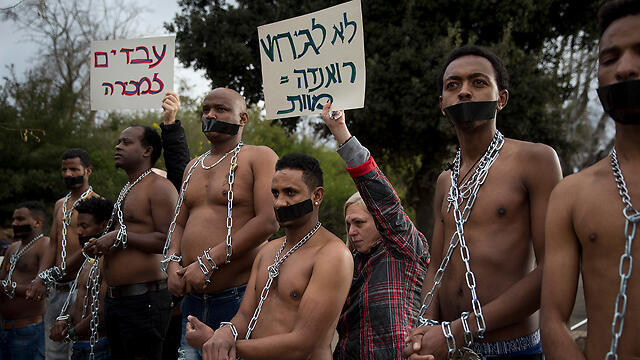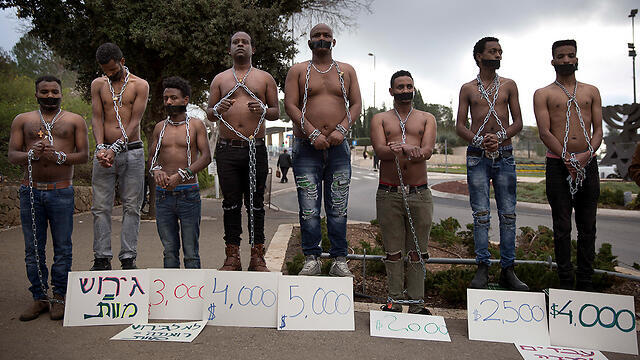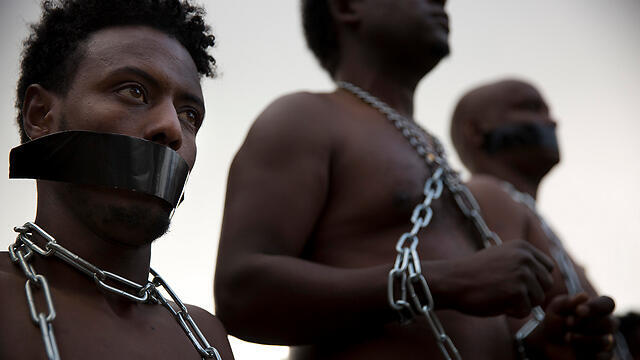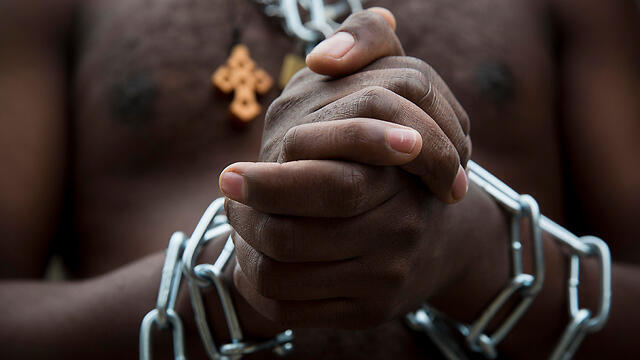Getting your Trinity Audio player ready...
Thirty-five of Israel's top authors and poets have signed a public statement urging the government to nix the plan for the mass deportation of African refugees.
Among the signatories are Israel Prize recipients Amos Oz and A. B. Yehoshua, as well as David Grossman, Orly Castel-Bloom, Meir Shalev, Etgar Keret, Zeruya Shalev and Agi Mishol.
"We call on you to stop the expulsion of the asylum seekers from Eritrea and Sudan, men and women who carry on their bodies and souls the horrendous scars from their escape and from the torture camps in Sinai, and children who were born in Israel—all are asking only one thing: To live," the authors' statement said.
"Compared to the massive wave of refugees taking over the West and the African continent, the number of asylum seekers in Israel constitutes less than half a percent of the population, and Israel's gates have been closed to them since 2012. Israel doesn't have a refugee problem, and it doesn't have any financial difficulty to absorb and settle them," the writers asserted.
They went on to emphasize that "Jews must not persecute and banish refugees, the State of Israel must not cause this humanitarian disaster, and you have the privilege to prevent it."
"The expulsion of asylum seekers is expected to begin right before Holocaust Remembrance Day. We call on you to act morally, and with the humanity and compassion befitting the Jewish people, and stop the expulsions of the refugees to the hell from which they escaped," the writers pleaded.
The campaign to deport asylum seekers began earlier this month when the Population and Immigration Authority started calling on Eritrea and Sudanese nationals to leave the country within three months in return for a financial grant.
Starting in April, the authority plans to imprison asylum seekers who remain in Israel and take actions against Israelis who employ them. In addition, the Holot detention center, where illegal infiltrators are being held, will be closed .
Hundreds of personnel are being recruited to carry out the deportation operation.
"You have to remember that Israel is a signatory to the Geneva Convention," playwright Joshua Sobol, who also signed the public statement, told Yedioth Ahronoth. "The convention defines a refugee as one who left his country out of fear for his life. The convention forbids the countries that signed it to expel refugees back to where they escaped from, regardless of whether the asylum seeker entered the country legally or not. These rules were determined based on data gathered during the Nazi regime, when Jews were the ones crossing borders and seeking protection. So what does the State of Israel do? It expels the refugees, while wasting money, to a third country, Rwanda ."
Poet and translator Tal Nitzán, who initiated with public statement, added that "In 2007, members of Knesset, including Benjamin Netanyahu, signed a petition that determined that 'The absorption of asylum seekers is a supreme moral duty in light of the history of the Jewish people and the values of democracy and humanity.' I hope there is an ounce of humanity and common sense left in the Knesset and government for them to regain their senses and stop the disaster of expulsion, this absurd of a country with a history of refugees that expels refugees to death and torture."
The writers are not alone. Several religious-Zionist rabbis also called to on the government to fulfill its "international commitment to stop the cruel expulsion policy, which contradicts Jewish tradition."
The rabbis, including Aharon Leibovitz, Michael Melchior, Yakov Nagen and Dr. Zev Farber, wrote in a letter to the government that "As a Jewish state, we cannot close our hearts completely to the cries of these wretched people. We propose therefore to differentiate between additional uncontrolled infiltration into the country—the stopping of which we support—and the treatment towards those people who are already living among us, and who will be found eligible for assistance based on fair criteria—who we consider worthy of compassion and of the investment of efforts to absorb them. This is true particularly for thousands of children who are growing up in Israel with Hebrew as their first language."
According to data presented at an emergency meeting at the Knesset on Wednesday, there are still 8,588 asylum requests pending a response from the State of Israel. So far, only 11 asylum seekers have received refugee status in Israel.
The emergency meeting, organized by MKs Michal Rozin (Meretz), Eyal Ben-Reuven (Zionist Union) and Dov Khenin (Joint List), included representatives from government ministries, south Tel Aviv residents, business owners, civil society organizations, academics and experts in the field, alongside asylum seekers and refugees who told their stories.
The speakers at the meeting called on the government to implement a plan to examine the asylum seekers' requests.
While the conference was underway inside the Knesset, asylum seekers protested outside, warning that expulsion meant death.
Amir Alon contributed to this story.





